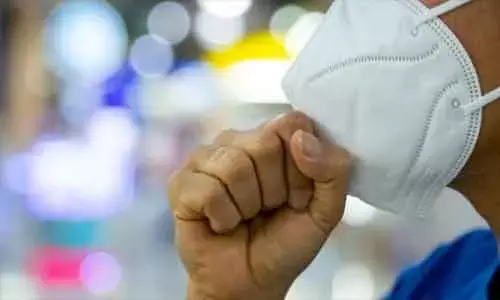- Home
- Medical news & Guidelines
- Anesthesiology
- Cardiology and CTVS
- Critical Care
- Dentistry
- Dermatology
- Diabetes and Endocrinology
- ENT
- Gastroenterology
- Medicine
- Nephrology
- Neurology
- Obstretics-Gynaecology
- Oncology
- Ophthalmology
- Orthopaedics
- Pediatrics-Neonatology
- Psychiatry
- Pulmonology
- Radiology
- Surgery
- Urology
- Laboratory Medicine
- Diet
- Nursing
- Paramedical
- Physiotherapy
- Health news
- Fact Check
- Bone Health Fact Check
- Brain Health Fact Check
- Cancer Related Fact Check
- Child Care Fact Check
- Dental and oral health fact check
- Diabetes and metabolic health fact check
- Diet and Nutrition Fact Check
- Eye and ENT Care Fact Check
- Fitness fact check
- Gut health fact check
- Heart health fact check
- Kidney health fact check
- Medical education fact check
- Men's health fact check
- Respiratory fact check
- Skin and hair care fact check
- Vaccine and Immunization fact check
- Women's health fact check
- AYUSH
- State News
- Andaman and Nicobar Islands
- Andhra Pradesh
- Arunachal Pradesh
- Assam
- Bihar
- Chandigarh
- Chattisgarh
- Dadra and Nagar Haveli
- Daman and Diu
- Delhi
- Goa
- Gujarat
- Haryana
- Himachal Pradesh
- Jammu & Kashmir
- Jharkhand
- Karnataka
- Kerala
- Ladakh
- Lakshadweep
- Madhya Pradesh
- Maharashtra
- Manipur
- Meghalaya
- Mizoram
- Nagaland
- Odisha
- Puducherry
- Punjab
- Rajasthan
- Sikkim
- Tamil Nadu
- Telangana
- Tripura
- Uttar Pradesh
- Uttrakhand
- West Bengal
- Medical Education
- Industry
Guidance to ration scarce Medical Resources during Covid-19 pandemic

The coronavirus disease 2019 (COVID-19) pandemic has led to unprecedent stress to patients and health care systems across the globe. In absence of any vaccine or treatment for the underlying infection, current health efforts are focused on providing appropriate intensive services for those with the most severe symptoms.
The emerging COVID-19 pandemic "can place extraordinary and sustained demands on public health and health systems and on providers of essential community services.It is understandable that such demands will create the need to ration medical equipment and interventions.
Many countries face scarcity of medical resources in the COVID-19 pandemic, including tests, personal protective equipment, ICU beds, and ventilators.
The most difficult decision is how to allocate ventilators. Experts feel that hospitals should create triage committees to help insulate physicians from distressing decisions of distribution of ventilators.The job of these committees will be to save the most lives possible in a time of unprecedented crisis.
A New England Journal of Medicine (NEJM) Sounding Board article elaborated on 6 recommendations to guide decisions over scarce resource allocation.
Key recommendations are-
1.Maximizing benefits by aiming "at saving the most lives and at maximizing improvements in individuals' post-treatment length of life" is the foremost guide to decision-making.
2.Scarce COVID-19 interventions should go first to frontline health care workers and those who keep critical infrastructure operating.
3.Patients with similar prognoses should be given scarce resources by random allocation rather than on a first-come, first-serve basis.
4.Prioritization decisions should be based on type of intervention and maximizing benefits and should be flexible to new evidence.
5.Patients who assume risk by participating in research should be rewarded in allocation decisions.
6.No differences should exist in allocating scarce resources between patients with COVID-19 and those with other diseases.
Governments and policy makers must do all they can to prevent the scarcity of medical resources. However, if resources do become scarce, we believe the six recommendations we delineate should be used to develop guidelines that can be applied fairly and consistently across cases.
For further reference log on:
Emanuel EJ, Persad G, Upshur R, Thome B, Parker M, Glickman A, Zhang C, Boyle C, Smith M, Phillips JP. Fair Allocation of Scarce Medical Resources in the Time of Covid-19. N Engl J Med. 2020 Mar 23 [Epub ahead of print]. doi: 10.1056/NEJMsb2005114. PMID: 32202722
Dr Kamal Kant Kohli-MBBS, DTCD- a chest specialist with more than 30 years of practice and a flair for writing clinical articles, Dr Kamal Kant Kohli joined Medical Dialogues as a Chief Editor of Medical News. Besides writing articles, as an editor, he proofreads and verifies all the medical content published on Medical Dialogues including those coming from journals, studies,medical conferences,guidelines etc. Email: drkohli@medicaldialogues.in. Contact no. 011-43720751


